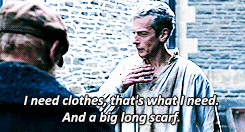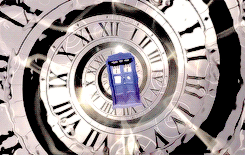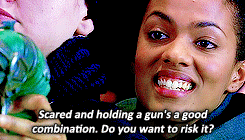Series 8, Story 2 (Overall Series Story #247) | Previous - Next | Index
| Image via I'll go with you |
"Dalek" featured a damaged Dalek, "Asylum of the Daleks" as well. "Victory of the Daleks" featured a Dalek who appeared to be a Good Guy. The Doctor's been shrunk in "Planet of Giants" and in "The Armageddon Factor". The promotional material said: "Confronted with a decision that could change the Daleks forever, he is forced to examine his conscience. Will he find the answer to the question, ‘am I a good man?’” That hinted at a "Genesis of the Daleks"-type dilemma. "Into the Dalek," needed to have something more than a Fantastic Voyage homage grafted on top of all that going for it if it was going to be any good*. Spoilers follow.
It's much more than that. Better than I thought it could be based on what little I knew about it going in. Not perfect, but we're on a good trajectory and Capaldi should have won over any doubters by now.
The thing folks are going to harp on, I suspect, is this Dalek calling this Doctor "a good Dalek." Where Nine was only a Doctor who "would make a good Dalek." Let's not make too much of this. The Doctor isn't a Dalek. Of course, a Dalek is going to find the hatred the Doctor has for the Daleks and run with it. It is a Dalek, after all, and you know what they say about how hammers see every problem and why scorpions sting trusting frogs in the middle of rivers.
Clara drives home the point when she tells the Doctor she "doesn't know". He's trying to be a good man and that's the point. She very easily could have turned his own words back on him and told him that's not the question. The question is: are you trying to do good? If the answer to that is yes, well, then you have your answer.
| "Waste no more time arguing about what a good man should be. Be one ... " -- Marcus Aurelius Image via Doctor Who TV |
So, what did we learn about Missy? She seems to be making a habit of nabbing the folks (and droids) who died as a result of the Doctor's actions. We didn't see her get the first soldier to die by Dalek antibodies, but she very well may have? At first I thought not, because his body was specifically called out as being the top level of slime in the Dalek's protein pit, where the female soldier who sacrificed herself for the mission looked to go to the Nethersphere in a flash of light. But, Half-Face droid's body was impaled atop Big Ben and he still found himself with Missy, but, if he -- as I suspect -- jumped rather than being pushed, then she may only be taking those who sacrifice themselves? How long as she been doing this, anyways, and how many has she got? (These questions on top of the questions we already had: who is she, by what means is she doing it, why and to what end, and where is this Nethersphere?) Your guess remains as good or better than mine.
The Dalek and Doctor part of the story turned out to be better than it sounded going in. The Doctor and Clara's relationship continues to be more interesting than, frankly, it ever was when it was Eleven and the Impossible Girl. Clara and Mr. Pink's burgeoning romance started quite well in terms of being watchable rom-com inside a sci-fi action piece (among other things). There's no reason to be surprised Moffat can write competent rom-com, only, I suppose, reason to be surprised he's still doing it all. But, it's fine, Doctor Who is large and contains multitudes.
You know it's great to see DW doing? Weird shit. We don't see enough psychedelic oddity these days like what we got with the nano-Doctor and nano-Clara stepping through the (gelatinous, who knew?) lens of the Dalek's eyestalk. Talk of consciousness expansion leading to personal growth combined with trippy imagery takes us back to shows origins in the Sixties -- in a good way. Small touches too, like the one shot early on in the TARDIS where the camera is low, under the plane of the console surface, looking up at a lever from Journey's perspective just after her rescue, with the spinning discs above the console ... I don't know if that's Ben Wheatley's direction or the cinematographer's skill (do we even talk about cinematography in the context of TV?), but it's lovely. Mixing elements like those in keeps it visually interesting and it looks fresher than it has for ... a long while?
What didn't quite work? Nano-Doctor speechifying in front of the Dalek's eye was OK, but it looked too much like "Rings of Akhaten" redux. (Mercifully, Capaldi's Doctor is several shades less histrionic and bombastic than Smith's in similar circumstances.) Mr. Pink being a soldier and Clara's line about her not having a rule against soldiers was perhaps a touch heavy-handed after the Doctor refused to let Journey join them. The nanos dried out pretty quick after that slide into the Dalek's internal slime pit.
On re-watch, the thing that actually rankled the most was how Moffat and Ford set out to establish Pink's bona fides as handsome fella all the ladies want and the men admire. The tear that escapes when he answers the student's question about whether he ever killed a "not soldier" works in that moment, but when considered in the context of how he's perceived as a ladykiller it comes across as a manipulative bit of "see what a tortured soul he is". When the lady in the administrative office keeps trying to get some salacious details about his weekend out of him by repeating "I bet you did," or however she phrased it, stopping just short of a Python-esque "wink, wink, nudge, nudge," we cringe for the character if we stop to think what it is the writer is trying to say about her.
Stray Observations:
- It didn't click during the first watch, but trionic radiation kept ringing a bell ... it's from, or a callback to, "The Talons of Weng Chiang" and the trionic lattice Greel used to locate his time cabinet.
- Is it possible for a Dalek to look forlorn? When Rusty heads back to join the Dalek ship, he pauses and looks back over his shoulder ... well, you know spins his stalk slowly ... in a way that feels, if we apply Checkov's Gun Principle, like a sign that we haven't seen the last of him.
* According to Nerdist, Steven Moffat said: If “Deep Breath” was Peter Capaldi’s “Robot” (the first Tom Baker serial; very silly and very not in keeping with the tone of the rest of his first season), then “Into the Dalek” might well be Capaldi’s “The Ark in Space” (Baker’s second story and still in the top five Fourth Doctor serials full stop). But the better analysis might be that "Robot" was Tom Baker brought in to do Jon Pertwee story for Barry Letts and Terrance Dicks, while "The Ark in Space" was the first Tom Baker story that we can identify as belonging to Hinchcliffe and Holmes. The shift from Barry Letts to Philip Hinchcliffe made a world of difference between the first two Tom Baker stories. What we've got now is still Moffat's baby so there's no changing of the guard to account for massive tonal changes. Not that there were massive tonal changes to account for. "Into the Dalek" is, like "Ark" was relative to "Robot", better than "Deep Breath", but not by much.









